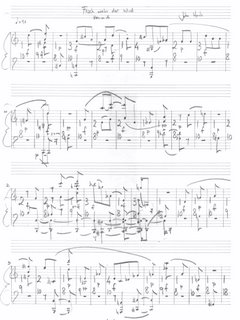Will photocopy the 10 A4 pages finished today and hand copies to P and to F and watch their reactions.
Listened to Saturday's (25/02/06) Hear and Now today. It was mainly a recording of Scandinavian New Music played by the BBC Scottish Symphony Orchestra, finished off with two pieces from recent CD releases, and a recording of Terje Isungset's Iceman Is, played on ice percussion, ice trumpet and voice. I think that although the quality of the work was generally high, there were some pieces better than others. Pulkkis's Encanto made me think of Messiaen (but only towards the end) but it had a nice stillness (both harmonic and rhythmic). Nordin's Arv was very nice, but I felt that the end was a little too predictable and a little too overdone. Hillborg's Mirages was just too fluent for my liking. There were too many undigested harmonic functions (don't get me wrong - I'm fine with tonality. You want to write tonality? I'm in favour. But do it in an interesting way please!) and it made me think of Vaughan-Williams and Sibelius quite a lot. Also I thought that the quotations were nauseating. Almost literally. They were just nasty and gratuitous. And too loud. Wallin's Chi had nice bits but I can't say that I was blown away by it. The overall form just didn't convince me.
The two CD excerpts, by two female composers came next. Ragnhild Berstad's Verto made me think of Lachenmann's musique concrete instrumentale and therefore I'd disagree with Alwynne Pritchard's statement about this being obviously written by a woman. Natasha Barrett's Ras was quite nice, rather like an acousmatic electroacoustic piece. The percussion certainly didn't detract from the overall effect but I was left wondering what they added. I don't want to say much about Iceman Is not because I didn't like it, but because it was a short extract full of beguiling sounds, that didn't make much sense without the rest of it.
Also I went back to listen to Hear and Now from November 26th 2005, which focused on the bmic Cutting Edge concert called Soundings. The music was by British and Austrian composers. Joe Cutler's Without Fear of Vertigo was nice and clunky, with a well-contained promise that it could go off the rails at any point and go beserk. It was fairly obvious that Ivan Hewitt had never read Italo Calvino's If Upon A Winter's Night A Traveller since he described Calvino as an aloof, learned and quietly mysterious author... (also I think that he's misunderstood the part that Without Fear of Vertigo plays within the novel). Johannes Maria Staub's Black Moon was great. Hysterical, controlled delerium? It contrasted severely with the boring, disjointed and predictable Orchestral Airs by Johanna Doderer. The only time these songs worked for me was when they were grinding to a halt and reminded me of Lars Hallnäs (shades of Mahler's Urlicht too methought). Next, Infra la neve by Marcel Reuter didn't really grab me. It was nice enough but there was nothing really there as far as I could tell. Also, the sound of the pianist's chair creaking was incredibly distracting. David Horne's Spike was sub-David-Sawyer. He even uses the term 'aural camouflage'. Just a little too British for me. The second Staub piece, Arie am Rande Alter Bücher was fairly nice, but I didn't like it as much as Black Moon. wo Lippen die Blätter zu Zeichen bewegen by Reinhard Fuchs was quite convincing, but after a while all contemporary flute music begins to sound the same to me. I'm currently in the middle of listening to the Schwerstik Twilight Music - A Celtic Serenade for Octet and went from hating it to quite liking it. I think it might be too long though... I'll let you know!
Hearing the lovely Alwynne presenting Hear and Now reminded me of the interview she conducted with me on the occasion of my one and only broadcast. I think I made a total hash of it to be perfectly honest. She asked me whether Lovesongs was an emotive piece, written from personal experience. I got flustered, stuttered a little and waffled on saying that it was expressive, but that I wasn't sure what it was expressing. I've been thinking about that again, and I think that I'm trying to almost paint a self-portrait in music every single time I write anything. This connects, for me, with the idea of expression and communication through composition, and with Ferneyhough's ideas about recreating himself with each composition. I'm not sure I'd go that far. I'd like to think that I'm exploring aspects of myself through the act of composition (and therefore changing as a result) but only in the same way that I do when I read a well-written book or poem. Maybe I should try to email her to give her my updated answer!
Crossword was by Rufus today. I got all but 4 clues. In case you were wondering.

